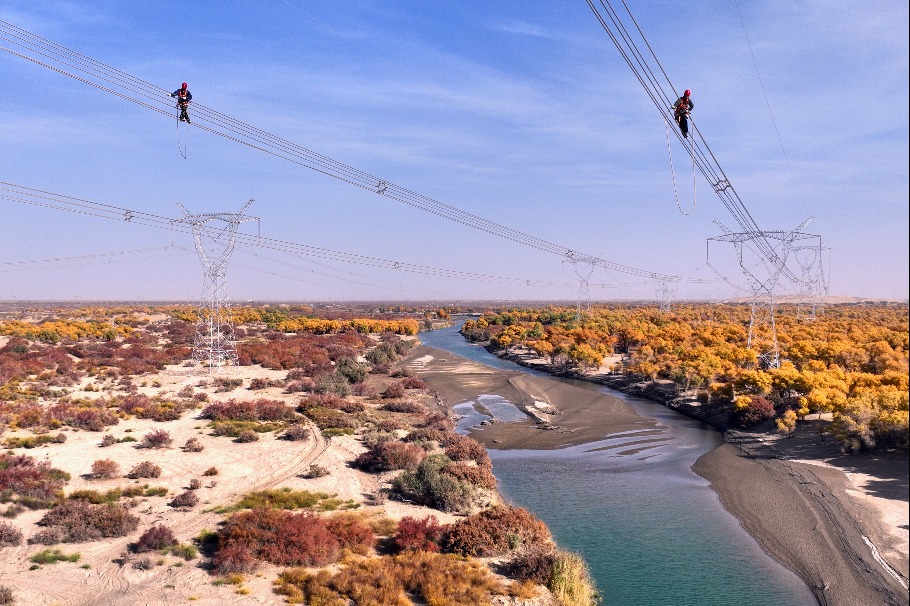China must engage more people in economy

The drop in the Chinese stock market was the event that touched off the current worldwide market panic, but the fundamental problems are deeper and go beyond China.
The economic outlook in Europe and Japan remains quite sluggish, and even the United States, which has been doing significantly better, is not doing exceptionally well.
With interest rates very low, as they have been for a long time, people have been looking for places to put money that would yield higher returns than the low yields on major government bonds.
The result has been a flood of money into a number of speculative ventures, mostly in developing countries. Then, as soon as there is some bad news in any of these countries, money flows out again, often very quickly; the resulting instability can be quite harmful.
The fact that some of these countries (especially China, but also India) have very high savings rates exacerbates that pressure, as this money is also looking around for investments, and in some cases (including China), people face legal limits on the sorts of investments they are allowed to make.
As long as people believe that a country like China will continue to grow very rapidly, there will be investment demand to absorb much of this savings, but as soon as one sees any slowing of growth forecasts (and some slowing is inevitable), the situation becomes unbalanced.
This is further exacerbated by loose regulation in many countries, which means that people often invest in companies even without being able to have confidence in the honesty of their data; thus, when some bad news comes out, people find it hard to have confidence that the overall situation is not so bad.
The Chinese government's recent responses have not helped - the interventions in the stock market may have slowed the decline a bit, but they also were pretty heavy-handed, and so did not increase confidence.
The recent currency devaluations may help China a bit, by boosting exports, but in the long run, China needs to rely more on domestic demand. So a return to pushing exports aggressively does not help people's confidence. It is also a problem for the countries whose own goods compete with Chinese exports, and so increases pessimism in those countries.
This does not necessarily mean that the long-term outlook is bad either for China or for others. China still has enormous growth potential, partly through continued urbanization, which probably has another 15 years or so to run, and continued upgrading of the labor force's skills.
As China's population gets older, each worker will have to be more productive; that will require heavy investments in health and education, among other things, and institutional change to make it more worthwhile for both firms and individuals to invest in skill acquisition.
Making it easier for migrants to stay in the cities and get full legal rights there (such as education for their children) would be one important step, because it would make it more likely that these workers would stay with the same firm for a long time, and thus make it more worthwhile to train them.
Changes that would make people feel more comfortable about lowering their savings rate - such as providing better, subsidized health insurance so that people feel less need to put money aside for the possibility of illness, and improving the safety net for people who are aging and people with disabilities - would also help. So would major investments in things that China needs anyway, to cope with the consequences of its recent development - more investment in environmental protection, in old age-care facilities and so on.
Fiscal reform also could help, especially if it reduced the pressure on localities to lease land extremely cheaply to manufacturers, effectively subsidizing them. As China gets richer, it needs to shift more of its economy into services - this can be beneficial both economically and environmentally, because services tend to be less energy-intensive, less water-intensive and so on.
Steps have to be taken to ensure that people pushed out of the countryside by development receive more reliable and adequate compensation, enabling them, too, to become significant consumers.
And all countries - not just developing ones - need to do more to reduce the risks from poorly regulated financial institutions, especially things that aren't officially banks, but perform many banklike functions - and so could cause massive problems if people lost confidence in them - while also trading in the kinds of high-risk assets that banks traditionally have kept away from.
Trying to stimulate exports on the other hand, is a quick and relatively easy thing to do, and so maybe it's not surprising that that's what the government reached for.
But this is a global slowdown, not just a Chinese one, and we can't all prosper by increasing out export surpluses - and if everybody tries at once we will get destructive currency and trade wars.
It would be far better for governments to take steps to increase demand, both from the public sector and from consumers - especially some of the poorer potential consumers who have not yet shared fully in China's growth.
Kenneth Pomeranz is a professor in the Department of History, East Asian Languages and Civilizations at the University of Chicago.

(China Daily USA 08/27/2015 page12)
Today's Top News
- US tariff war a wild goose chase
- Xi congratulates Jennifer Simons on election as Surinamese president
- Australian PM's visit aims to boost cooperation amid global challenges
- China says response to Japanese planes' actions reasonable, professional
- Wang calls Rubio meeting constructive
- Tianzhou 9 cargo craft transported to launch site






























